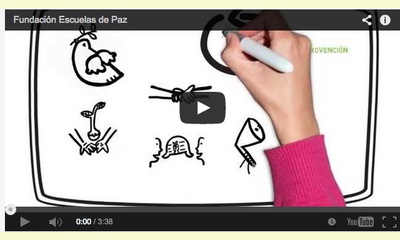|
|
Week for Peace in Colombia
un articulo por Amada Benavides de Perez from the Foundation Schools of Peace, her remarks before the Legislative Marathon for Peace of the Congress of the Republic of Colombia on 10 September, 2014 - English version translated by Johan Camilo Rodríguez Zárate, Volunteer at the Foundation Schools of Peace, and edited by CPNN
For 27 years without interruption the week of peace has been held
in Colombia. during the first week of September. During the week,
numerous civil society organizations from many different sectors,
have gathered under the leadership of Peace Programme of the
Compañia de Jesus, REDEPAZ, and the National Secretariat of Social
Pastoral of the Conferencia Episcopal, to address the issue of
building cultures of peace. The call has been made year after year,
consistently, sometimes with more or sometimes with less success,
but persistent in the idea that peace is not only the cessation of
arms, but must address the structural and cultural elements that
have perpetuated the various forms of violence that afflict our
country. 
Image for video by Fundación Escuelas de Paz
click on photo to enlarge
Peace Week has been a scenario that makes visible the multiple
initiatives that quietly circulate throughout the country, anxiously
awaiting the annual meeting to be released, and network with other
organizations. They work from day to day with ordinary people who
don’t have the microphones of the media, and who don't have the
resources to make themselves known, but nevertheless, persist and
refuse to disappear.
This year, it has been a favorable scenario for the Week for Peace,
which has made them multiply activities that we can see both in the
media, political spaces, including the parliamentary session, and
private business sectors. For those who have experienced the ups
and downs over the years of the Week for Peace, this has been very
enjoyable to see. It has nourished thecontent, actions and
transformations ranging from individual to collective economic
stakes, social, political and cultural, artistic, sporting, to name just
a few sectors.
"There will be no peace without peace education", is the slogan of
the international organization
The Hague Appeal for Peace, slogan that we want to share with you
today. Building cultures of peace has multiple management areas,
but certainly peace education is the most expeditious vehicle. We
are pleased that for this purpose there are united wills and
consensus. For the first time ever the subject of peace education
was present in the the second term of President of Colombia Dr.
Juan Manuel Santos Calderón, with the words of the president of the
Congress, Mr José David Name. He said: "This new conception of
education must serve and be oriented towards peace ... Educating
for peace is a way to teach values. The Peace Education implicitly
includes other values such as justice, democracy, solidarity,
tolerance, coexistence, respect, cooperation, autonomy, rationality,
love for truth, to which I would add: Forgiveness. In Colombia,
Peace education should carry implicit forgiveness and
reconciliation." Education was also identified as one of the
cornerstones of the second term of President Dr. Juan Manuel
Santos.
(This article is continued in the discussionboard)
( Click here for the original version in Spanish)
|








|
DISCUSSION
No hay pregunta ligada a este article.
* * * * *
Comentario más reciente:
:
(The following is continued from the main article listed above.)
At the legislative level, the adoption of the law 1620 of 2013 which created the National System of School Coexistence increased the debate on the future of education in the country since the protests of teachers and students, the youth movement for education, and the opening of national debate for national reconciliation in post-conflict emergency, place us in an environment conducive to the development of peace education as a discipline that has pedagogies, methodologies and specialized didactic content.
Peace Education is a tool to advance the construction of a culture of peace, which aims to transform our culture based on violence to a culture of peace. It is part of a global movement led by UNESCO since 1986 with the Seville Statement and the Conference of Yamoussoukro; defined by the Manifesto 2000, which inaugurated the new millennium with eight specific points for building cultures of peace as well as resolutions such as A/53/243 of 6 October 1999 of the General Assembly of the United Nations and the 2000/66 from the former Commission on Human Rights.
The Foundation Schools of Peace, as well as numerous other non-governmental organizations and academic institutions, have been working for more than a decade in the construction of this
alternative and new pedagogy. It is based on popular pedagogy, art, sports and culture, to support various population groups in the pursuit of their individual projects, community life and the construction of new political projects that build a culture of peace.
In this sense, peace education work is developed not only in formal education settings, but in multiple educational settings: non- formal and informal, and not just with children and young people, but with people at all levels, from political leaders to small communities.
At national and international levels there are multiple conceptual, practical and successful experiences on this issue. We welcome the opportunity to open them in Colombia, due to the new political situation, but mainly, because after 60 years of violence, largely rooted in our culture, the time has come to develop and advance cultures of peace that have been growing silently from the deepest levels of our country.

|
|









